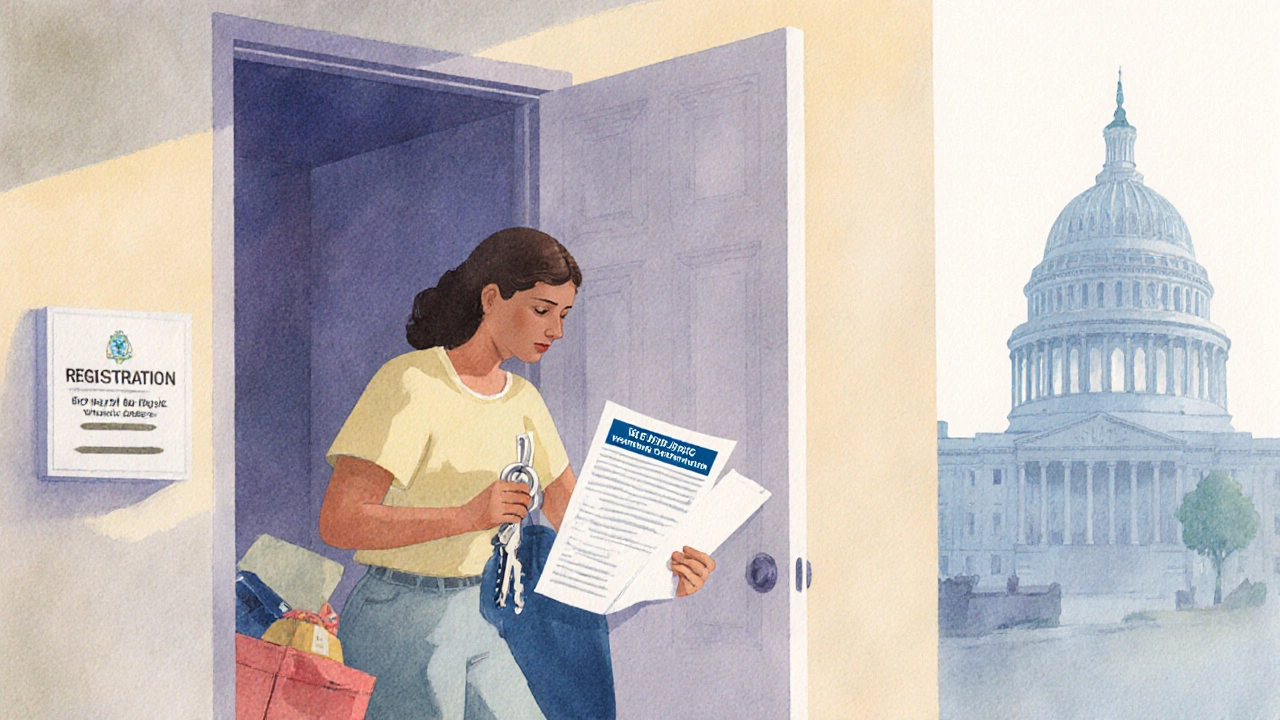2024 Maryland Landlord‑Tenant Law Changes: What Renters & Owners Must Know

Oct, 16 2025
Maryland Rent Increase Calculator
Calculate the maximum allowable rent increase under Maryland's 2024 landlord-tenant law. Starting July 1, 2024, landlords can raise rent only once per 12-month period with a maximum increase of 5% plus the regional Consumer Price Index (CPI) adjustment.
How It Works
Maximum increase = 5% + CPI
Only one increase per 12 months
Landlords must provide a 60-day written notice
Your Maximum Rent Increase
Maryland just rolled out a set of landlord‑tenant law updates for 2024, and they affect everyone who rents or rents out property in the state. Whether you’re a first‑time renter, a seasoned property owner, or a property manager, you’ll want to know the new caps on rent hikes, tighter rules on security deposits, and fresh protections for vulnerable tenants.
What the 2024 Law Covers
Maryland landlord‑tenant law (2024) is a comprehensive amendment package that took effect on January 1, 2024. It amends the Maryland Code, Real Property Article, and introduces new administrative rules administered by the Maryland Department of Housing and Community Development (DHCD). The goal is to balance landlord rights with stronger tenant safeguards, especially after the pandemic‑driven housing squeeze.
Key changes fall into six buckets: rent increase limits, security‑deposit handling, eviction procedures, late‑fee restrictions, habitability standards, and protections for victims of domestic violence.
Rent Increase Cap: How Much Can You Raise?
Starting July 1, 2024, landlords can raise rent only once per 12‑month period, and the increase cannot exceed 5% plus the regional Consumer Price Index (CPI) adjustment. For example, a property in Baltimore County with a CPI rise of 2% can see a maximum 7% increase.
- Maximum increase = 5% + CPI
- Only one increase per 12 months
- Landlords must give a written 60‑day notice
Rent‑control‑exempt properties-like new construction within the last three years-are not subject to this cap.
Security Deposit Limits
Security deposit limits are now capped at two months’ rent for month‑to‑month leases and one month’s rent for fixed‑term leases. Landlords must place deposits in a separate, interest‑bearing account and provide tenants with an annual accounting statement.
- Maximum: 2 months’ rent (month‑to‑month) or 1 month (fixed term)
- Must be held in an interest‑bearing account
- Annual statement required
- Interest earned belongs to the tenant
Failure to comply can lead to a statutory penalty of up to three times the deposit amount.
Eviction Process Overhaul
Eviction process rules have been tightened to curb “cash‑for‑keys” tactics and ensure due process. Notable changes include:
- Mandatory mediation before filing a complaint, unless the tenant commits violent conduct.
- Extended notice periods: 30 days for non‑payment, 60 days for lease violations.
- Judges must order a written judicial review of any rent‑withholding claim.
Landlords who skip mediation can face a fine of up to $2,500 per illegal filing.
Late‑Fee Restrictions
Late fees are now limited to 5% of the monthly rent or $50, whichever is lower. The fee can be charged only after a 10‑day grace period following the due date.
- Maximum late fee: 5% of rent or $50
- Grace period: 10 days
- Fees must be disclosed in the lease agreement
Undisclosed or excessive fees constitute a violation of the new statute.

Habitability and Repair Obligations
Landlords must maintain a “habitable” dwelling, which now explicitly includes functional heating, plumbing, and pest‑free conditions year‑round. The law introduces a 14‑day “repair window”: after a tenant notifies the landlord in writing, the landlord has 14 days to begin repairs that affect health or safety.
If repairs are not started within that window, tenants may withhold rent or sue for damages up to twice the monthly rent.
Domestic Violence Protections
Victims of domestic violence now enjoy a 90‑day “safe‑exit” provision. Tenants can terminate a lease early without penalty if they provide a police report, restraining order, or a certified affidavit.
- 90‑day termination right
- No lease‑break fee
- Landlord must return the security deposit in full, minus any legitimate damages
This protection applies to all housing types, from single‑family homes to multi‑unit apartments.
Tenant Screening and Background Checks
Landlords may still run credit and criminal background checks, but the new law mandates that any adverse decision based on a criminal record must be accompanied by a written “adverse action notice” that details the specific criteria used.
The state also caps the fee charged to tenants for a background check at $25.
Landlord Registration and Licensing
Landlord registration is now mandatory for owners of three or more rental units. Registration is done through the DHCD portal and requires:
- Proof of ownership
- Proof of liability insurance
- Annual renewal fee of $150
Failure to register can result in a $5,000 civil penalty and potential loss of the right to file eviction actions.

Compliance Checklist
Use this quick checklist to make sure you’re compliant before the next rental cycle:
- Post the new rent‑increase cap notice in a visible location.
- Convert existing security deposits to the new two‑month limit if applicable.
- Set up a separate interest‑bearing account for deposits.
- Update lease agreements to reflect the new late‑fee cap and grace period.
- Establish a written repair‑request process with a 14‑day response timeline.
- Enroll in the DHCD landlord‑registration system if you have three+ units.
- Train staff on the mediation requirement before filing eviction complaints.
- Prepare template letters for domestic‑violence‑related lease terminations.
Common Pitfalls & Pro Tips
Pitfall: Assuming the old lease terms still apply after January 1, 2024. Pro tip: Review every active lease and amend any clauses that conflict with the new caps or notice periods.
Pitfall: Failing to disclose late‑fee terms. Pro tip: Insert a bolded “Late‑Fee” section in the lease and provide a copy to tenants at signing.
Pitfall: Ignoring the mediation requirement. Pro tip: Register with the Maryland Mediation Center and keep contact info handy for all properties.
Summary Table of 2024 Changes
| Area | Old Rule | New Rule (2024) | Compliance Deadline |
|---|---|---|---|
| Rent increase | No cap | 5% + CPI, one increase per 12 months | Immediate |
| Security deposit | Up to 3 months’ rent | 2 months (month‑to‑month) or 1 month (fixed) | Jan12024 |
| Eviction notice | 10‑day notice for non‑payment | 30‑day (non‑payment) / 60‑day (violation) + mediation | Immediate |
| Late fee | Any amount | 5% of rent or $50, after 10‑day grace | Immediate |
| Habitability repairs | No set response time | 14‑day start of repair after written notice | Immediate |
| Domestic‑violence lease break | No specific provision | 90‑day termination without penalty | Immediate |
| Landlord registration | Optional | Mandatory for 3+ units, $150 annual fee | Dec312024 |
Frequently Asked Questions
Frequently Asked Questions
Can a landlord raise rent more than once in a year if the tenant agrees?
No. The 2024 statute caps rent increases to one change per 12‑month period, regardless of tenant consent. Any agreement to exceed that limit is unenforceable.
What happens if a landlord keeps a security deposit over the new limit?
The landlord faces a statutory penalty up to three times the excess amount, and the tenant can sue for return of the over‑collected portion.
Are there any exemptions to the eviction‑mediation requirement?
Yes. If the tenant is involved in violent criminal activity or poses an immediate threat to safety, mediation can be bypassed, but the landlord must still document the reason.
How does the domestic‑violence lease‑break right affect the security deposit?
The landlord must return the full deposit, minus any legitimate, documented damages unrelated to the early termination.
Do the new rules apply to commercial leases?
No. The 2024 amendments target residential rental agreements. Commercial leases remain governed by separate statutes.